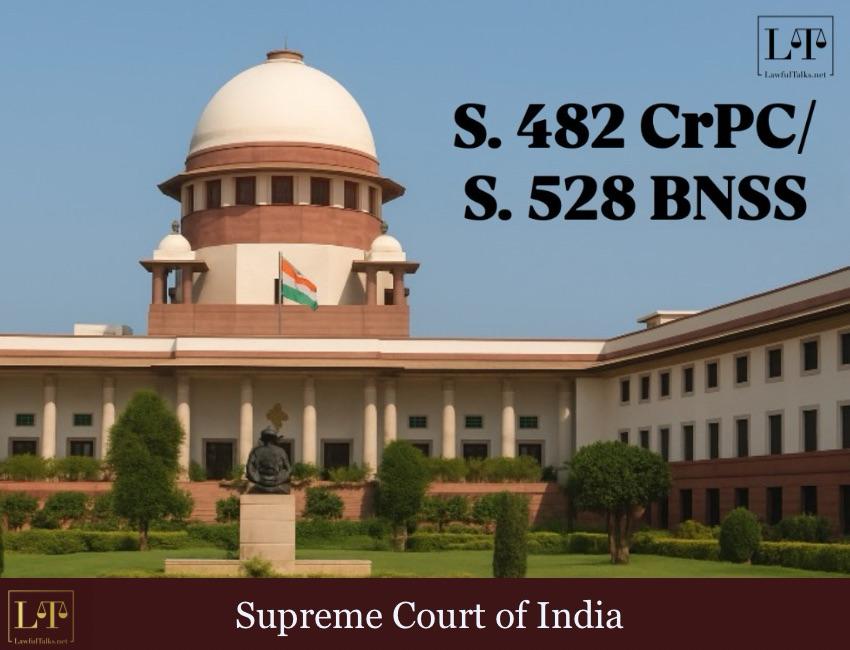Allahabad HC Sets Aside Afzal Ansari's Conviction, Allows Him to Continue as MP

The Supreme Court delivered a significant ruling cautioning High Courts against their tendency to dismiss petitions to quash First Information Reports (FIR’s ) purely based on their contents. The court emphasized that it is crucial for the courts to consider the broader context and circumstances surrounding the filing of an FIR.

The judgment delivered by Justice Sanjay Karol and Justice Prashant Kumar Mishra, further instructed that High Courts must evaluate whether an FIR is filed as a retaliatory action or a counterblast, potentially used as a tool to harass the litigant.
The bench clearly stated, “While it is true that elaborate defences and evidence brought on record is not to be considered at this stage, it is equally true that a mechanical approach cannot be countenanced. What renders a judicial mind distinct is its application to the given facts in accordance with law. Therefore, the Court ought to have appreciated, at least to some extent, the background in which the respondent filed the subject FIR.”
Referring to precedents such as CBI v. Aryan Singh and Rajeev Kourav v. Baisahab, the Court acknowledged that while the High Court's role at the S.482 CrPC stage is primarily to assess the prima facie possibility of the alleged offence, it must also take into account the contextual background in certain situations.
The judges voiced their criticism towards the Punjab & Haryana High Court for its mechanical refusal to quash the FIR without contemplating the surrounding factors. The High Court had based its decision solely on the FIR content, ignoring the circumstances in which it was filed. It explained that since the investigation was still at an early stage and there were allegations to look into, any intervention would be “too premature.”
Background:
The appellant (husband) , an Australian citizen of Indian origin, and the respondent, an Austrian citizen, were married according to Hindu rites and rituals on 29th November 2010 in Panchkula, Haryana, as both families resided in India. After marriage, the couple began their matrimonial life in Melbourne, Australia, on 18th December 2010, and a daughter was born on 29th September 2012.
However, on 30th June 2013, the respondent left the appellant without any prior notice, taking their daughter with her to Austria, her native country. Consequently, the appellant initiated proceedings in Austria under the Hague Convention on the Civil Aspects of International Child Abduction, 1980, seeking the child’s return to Australia.
The District Court of Vienna Inner City, by its order dated 8th January 2014, recorded the factual disputes between the parties, including differing views on parental roles and the respondent’s wish to relocate for the child’s education.
The court found that the appellant’s consent was neither given nor implied, and that there was no proof of any “grave risk” if the child returned. These are the key reasons to refuse a return under the Convention.
Therefore, the application was allowed, and the child’s return to Australia was directed. On appeal, however, the Vienna District Civil Court declined to intervene and change this order.
Justice Karol’s judgment pointed out that the High Court overlooked the fact that this FIR appeared to be a retaliatory act and a misuse of the legal process, coming just one month after the divorce decree in favor of the husband.
The Court remarked, “Here, the respondent filed the complaint after the grant of divorce, a month later. Granted that the same is not expressly prohibited by law, it certainly begs the question as to why despite having been separated from the appellant for almost three years to the date, did the respondent consider filing an application with the police at that relevant time. To entertain the possibility that the same is nothing but a counterblast to the fact that the appellant has two orders in his favour, one by the Courts in Austria ordering the respondent to bring the child back to Australia and the other, by the Courts in Australia, accepting the appellant's prayer for grant of divorce, does not appear far-fetched.”
The judgement concludes with the bench stating that, “Placing reliance on the above, and as a consequence of the discussion made supra, it is clear that the instant facts attract parameter 7 of those laid down in State of Haryana v. Bhajan Lal⁸ and as such, it can be said that if the FIR proceeds further, it would be an abuse of the process of law. Hence, the impugned judgment and the FIR subject matter of these proceedings, the particulars whereof are given in paragraph 1 of this judgment, stand quashed and set aside.”
Case Title: NITIN AHLUWALIA Versus STATE OF PUNJAB & ANR.
Appearance:
Advocate For Appellant(s) : Mr. Subash Bhat, Adv. Ms. Nikita Sharma, Adv. Ms. Lisha Chauhan, Adv. Mr. Anupam Raina, AOR Mr. Ankur Parihar, Adv.
Advocate For Respondent(s) : Mr. Karan Sharma, AOR Ms. Charu Mathur, AOR
Leave a Comment

Anam Sayyed
4th Year, Law Student
Latest Posts
Categories
- International News 19 Posts
- Supreme Court 306 Posts
- High Courts 318 Posts






























































































































































































































































































































































































































































































































































































































































